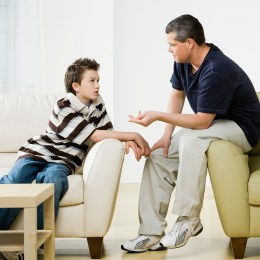
Father talking to son
Parents who talk to their kids about their own, past drug may not be helping their kids to avoid drugs.
“Talk to your kids about drugs,” has been a refrain sung to parents by anti-drug activists and in public service message for decades. But if these conversations include information about your own past drug use, a new study suggests that it could send potentially harmful mixed messages.
Researchers from the University of Illinois at Urbana-Champaign studied 561 6th to 8th graders, most of whom were white or Hispanic, about their drug use as well as conversations they had with their parents about drugs.
Reporting in the journal Human Communications Research, the researchers say that youth whose parents discussed the dangers of drugs and their disapproval of drug use had more anti-drug attitudes. Among the Hispanic students, this was linked with lower levels of reported alcohol use, while among white students it was associated with less reported marijuana use. No effect was found for either group on smoking.
MORE: ADHD Medications Improve Decision-Making, But Are They Being Over-Used?
But if parents also discussed their own youthful drinking or drug use, these conversations were linked with a reduction in anti-drug attitudes. “The more often the parents talked about regret over their own use, the bad things that happened, and that they’d never use it again, the students were more likely to report pro-substance-use beliefs,” lead author Jennifer Kam said to LiveScience.
“Kids might be interpreting it as ‘Mom and Dad used, and they’re still here,’ she told NPR. This confirms prior research that suggested that having former drug addicts tell their stories to teens can glamorize the condition, rather than highlighting the risks and deterring use.
“[T]he results suggest that parents’ references to their own prior use may be associated with their children’s perceptions that substance use is more common or prevalent among their peers or that their parents may not disapprove,” the authors write. And those perceptions about peers are important: numerous studies found that when youth have exaggerated ideas about how common heavy drinking and drug use are among their friends and classmates, they tend to use more, which is why many of the most successful prevention programs aim to change those misconceptions.
MORE: Hazelden Introduces Antiaddiction Medications into Recovery for First Time
However, because drug use levels among 12 to 13 year olds are extremely low— just 3% have tried marijuana, 8% have smoked a cigarette and 12% have had an alcoholic drink at least once in their lifetime — it may be hard to determine what effect parents’ personal drug revelations might have on drug use. And because the study looked at one single point in time, it’s impossible to know whether the parental disclosures caused the teens’ change in attitudes, or whether the parents, sensing a problem, decided to disclose in an attempt to help.
Nonetheless, the researchers argue that mixed messages— including ones sent by telling children that if they are attending a party and find themselves unable to drive or are facing a drive with a drunken friend, they should call home — in general are potentially problematic. “The presence of such messages may attenuate the protective nature of targeted parent-child communication,” they write.
So, what’s a parent to do? About 80% of teens have their first drink of alcohol before graduating high school— and most parents themselves were underage drinkers when they were teens. At least half of all adults with families tried marijuana and a significant proportion did much more than that.
Kam does not suggesting lying, but she does caution against volunteering the information unnecessarily. She notes, however, that this is among the first studies to look at the question of what effect such disclosures can have on drug use. The timing of the talk may also matter. If youth have already started experimenting, the authors write, “Parents’ discussion of substance use could be interpreted by children as ‘‘nagging,’’ which may have unintended negative consequences for youth [such as] increased substance use to cope with stress of parental nagging.” And they also cite research showing that once a child has started to drink, talking about rules related to drinking actually increases the behavior.
But addiction researcher Stanton Peele, author of Addiction Proof Your Child, who was not associated with the study, also notes that studies of “harm reduction” programs that teach people to rescue victims of overdose or provide clean needles to drug users, have not found that their mixed messages encourage drug use, only that they save lives. “The current study can only consider parents’ offering children safe rides—a potentially life-saving harm reduction technique— from the blinkered perspective that this subtly conveys the idea that the parents are okay with kids drinking,” he says.
MORE: Why Personality May Matter in Preventing Alcoholism
In addition, there is the related but equally challenging problem of what impact these findings might have on parental attitudes toward prescription drugs. “What [about] parents who conveyed positive attitudes towards prescribed antidepressant, antipsychotic, pain-killing, and ADHD drugs?” he asks, “Would that be a boon or a bane for kids’ future drug outcomes?” In the case of therapeutic drugs, he says, mixed messages are unavoidable.
In that case, parents should become models of responsible use, says Peele, particularly when it comes to alcohol. The best drug-abuse prevention messages have little to do with drugs themselves. “There are two things parents must convey to children to avoid the medicine chest of addictions now at everyone’s disposal,” he says, “The belief that they are strong enough to make healthy choices, and the value of wanting to live a positive and productive life. Without these essential elements, there are no warnings sufficient to prevent substance abuse and a host of other potential addictions.”

